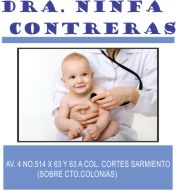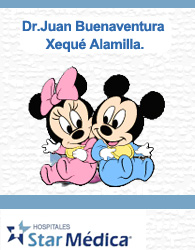Pediatrics is the branch within medicine that specializes in children's health and diseases, their diagnosis, treatment and prevention.
That is, the pediatrics will be close to the child from the birth moment of the birth to more or less adolescence.Although the aforementioned specialty will take care especially to diagnose diseases, as well as the best treatments to cure them, therefore studying the sick child, will also take care of studying the healthy child, in some way preventing the typical diseases that welcome them.
.
To the professional who deploys this medical specialty is known as a pediatrician.
Interesting articles
Can vomiting and diarrhea be dangerous?
Vomiting and diarrhea (liquid and frequent intestinal evacuations) can be harmful because they can cause dehydration. Dehydration occurs when too much liquids are lost. Young children and older adults can dehydrate quickly, but dehydration can happen at any age.
Causes and risk factors
What is the cause of vomiting and diarrhea?
Vomiting and diarrhea can be caused by a number of things, such as viruses, bacteria, parasites, some medications, or some medical condition. Difficult foods to digest (such as too sweet) and, meats and fish that are not well cooked (rawly or partially crude) can also cause vomiting and diarrhea.
Treatment
How to prevent dehydration?
Anyone who has had several episodes of vomiting or diarrhea will need to replace the liquids and electrolytes you have lost.
Babies: If you are breastfeeding, continue giving breast milk to your baby. Breast milk has the necessary fluids and electrolytes to prevent dehydration. Your doctor may also want to give your baby an oral rehydration solution (ORS). If you feed your baby with a formula, try to switch to a lactose-free formula while your baby is sick. Lactose worsens diarrhea. Your doctor may also recommend that you change the formula for an ORS for about 12 to 24 hours, and then return to the formula.
For young children: Use an ORS that contains the correct mixture of salt, sugar, potassium and other nutrients to help replace lost body fluids. Children over 1 year of age could also take clear soups, soups or clear juices mixed with water in equal parts to help prevent dehydration. You should avoid giving your child pure water and carbonated beverages. Pure water does not contain enough salts and nutrients to help dehydration. Carbonated beverages regularly have a high sugar content and can irritate your child's stomach.
For adults and older adults: To replace lost liquids due to vomiting and diarrhea, adults and elderly people should try to take at least 7 vessels of 8 ounces of water a day. Older adults can also take ORS or replace liquids in food to help replenish lost liquids.
The amniotic fluid does much more than cushion your baby's ride.
The amniotic fluid: It is both mundane and the poetic, a humble liquid that protects and nourish your baby. It also helps maintain a constant temperature; It promotes the growth and development of the lungs of the fetus, gastrointestinal system, muscles and bones, and avoids compression of the umbilical cord. Some studies even suggest that it transmits odors and flavors of the diet, helping to influence the future baby preferences of taste.
After 16 weeks, when the fetus begins to swallow the liquid, it is composed in part of the recycled urine. Volume increases around a cup in the first quarter for four glasses in the third quarter, then decreases about three long-term cups, says Jeanne A. Conry, MD, Ph.D., A GINECO-OBSTECTRA KAISER Permanent in Roseville, California & Ldquo; the amniotic fluid [levels] can be a reflection of the health of pregnancy & rdquo; says Conry. The tracks that are too little or too little as the decrease in fetal movement and a belly too large or too small, the current levels can be determined through ultrasound.
too little liquid
This occurs at approximately 4 percent of pregnancies and may indicate birth defects, especially those affecting the kidney or urinary tract, premature rupture of membranes (loss of fluid must be reported to their doctor of Immediate), or maternal health conditions, such as diabetes and pressure hypertension. & LDQUO; Too little liquid very early in pregnancy can affect the real growth of the child & rdquo; says Conry. & LDQUO; Later, the lack of buoyancy around the umbilical cord is combined with contractions can drop the baby's heart rate. & rdquo;
Too Liquid
This occurs at approximately 1 percent of pregnancies and may suggest birth defects, more frequently those of gastrointestinal and nervous systems that affect swallowing, fetal infection or heart rate anomalies, or maternal diabetes. Both conditions are closely monitored and treated, and tests are often done to make sure the baby is fine.
In the first month of life the schedules: from the baby is governed by the need to feed and by its temperament
During his first month of life, newborn babies use most of the time in sleeping. They wake up almost exclusively to eat, every 2-3 hours of average. Some babies spacish more take them during the night, since the beginning. This depends on the temperament of the newborn, although the type of power can also influence the schedules: of the baby.
Before birth, the baby does not have schedules:. She feeds on a continuous way through the placenta. She is not hungry. He sleeps when she seems and nobody controls it.
During the first month of life, the schedules: of a baby is usually a little chaotic and is basically governed by the need to feed. After satisfying the hunger, the baby relaxes and usually sleeps.
Some babies are regular to eat and sleep, others are less. This depends on the temperament of the baby.
Babies usually do between 8 and 12 chest shots the first 2-4 weeks of life and distribute them in two different ways:
Some, throughout the day and night.The intervals are always 2-3 hours.
Others, during the night they make a longer pause (4-5 hours), with equal number of tomas in total, that is, they take every 1 hour and a half or 2 hours.
Both types of babies ingest Similar amount of milk in total.
The internal rhythm of the baby is not easy to modify, and less achieve it right away.The schedules: from babies is adapting with respect to:
The milk flow.When the mother starts to produce an adequate amount of milk to the needs of the baby, usually from the third week, sometimes, later.
The care received, which will condition the quantity and quality of environmental stimuli.
During the first month, the baby sleeps, although there is noise around him or, even if it is full day.Later, these factors influence you more and more.










